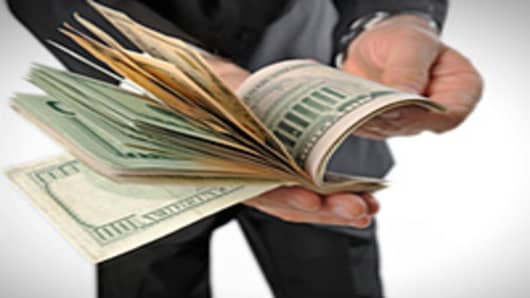* This post was updated on Friday June 17th. An earlier version cited the Pew Research Center when it should have cited Pew Center on the States, a division of The Pew Charitable Trusts.
Public pension funds managing the retirement and health care benefits of teachers and firemen are pouring money into hedge funds, as much as doubling the money they allocate to the industry, in a desperate attempt to bridge the funding gap in their plans.
“Our team met with several public pension plans, representing in excess of $200 billion in assets under management,” stated a Deutsche Bank prime brokerage report intended for hedge fund clients obtained by CNBC. “Many of these are planning to double their hedge fund allocations over the next 12 to 18 months.”
The move will likely spark a debate between pension fund managers and the state employees who will eventually need those funds as to whether hedge funds—many of which aided the credit bubble and then stumbled in the wake of its pop—are too risky to be stewards of these plans.
State pension systems are at best around 80 percent funded, based on the latest surveys by the Pew Center on the States, a division of The Pew Charitable Trusts, and recent returns. To make up that gap, many managers likely see no other choice with the S&P 500 Index little changed for the year and the yield on the 2-year Treasury hitting a record low Thursday.
“The fact that pensions are investing in hedge funds isn’t, by itself, a scary concept because many hedge funds are a less risky alternative to equities or real estate,” said Jim Iurio of TJM Institutional Services. “The problem here is that most of the pensions we are talking about are backed up against a wall and need to generate return or else turn to the taxpayer. This desperation makes it more likely that the pensions are looking for more risk and more leverage, which is absolutely a bad thing.”
States, on average, assume future annual returns of around 8 percent, according to Pew. If states lower that expectation, it increases the amount of their future liabilities and forces them to contribute money to the plans, likely by raising taxes.
This assumption was fine when the median return for pensions from 1984 to 2009 was more than 9 percent, but it’s not OK if the future is anything like the last decade, where returns averaged less than 4 percent, according to Pew figures.
Overall, hedge-fund industry performance (net of fees) has actually trailed the S&P 500 the last two years, although in 2008 during the credit crisis the funds dropped 19 percent, according to Hedge Fund Research, while the S&P 500 plunged 37 percent.
The hedge-fund industry is “becoming more institutionalized, larger and the spread between best and worst performers is narrowing, suggesting benchmarking behavior,” said Gina Sanchez, director of equity and asset allocation strategy for Roubini Global Economics. “The huge payout for the huge fees is probably gone. That said, high fees will be around for a while and that means that pensions funds will probably not get the performance they want for what they pay.”
To be sure, if hedge funds live up to the goal their names imply—higher returns with less volatility—the higher fees may be worth it for pension funds. The fee structure for hedge funds is typically “two and twenty,” or 2 percent of total assets plus 20 percent of any returns.
“It depends on the fund,” said Karen Finerman, President of Metropolitan Capital Advisors and a 'Fast Money' contributor. “Many hedge funds can give equity returns with less risk. That's what we try to do.”
For the best market insight, catch 'Fast Money' each night at 5pm ET, and the ‘Halftime Report’ each afternoon at 12:30 ET on CNBC.
______________________________________________________
Got something to say? Send us an e-mail at fastmoney-web@cnbc.com and your comment might be posted on the Rapid Recap! If you'd prefer to make a comment, but not have it published on our Web site, send your message to fastmoney@cnbc.com.



